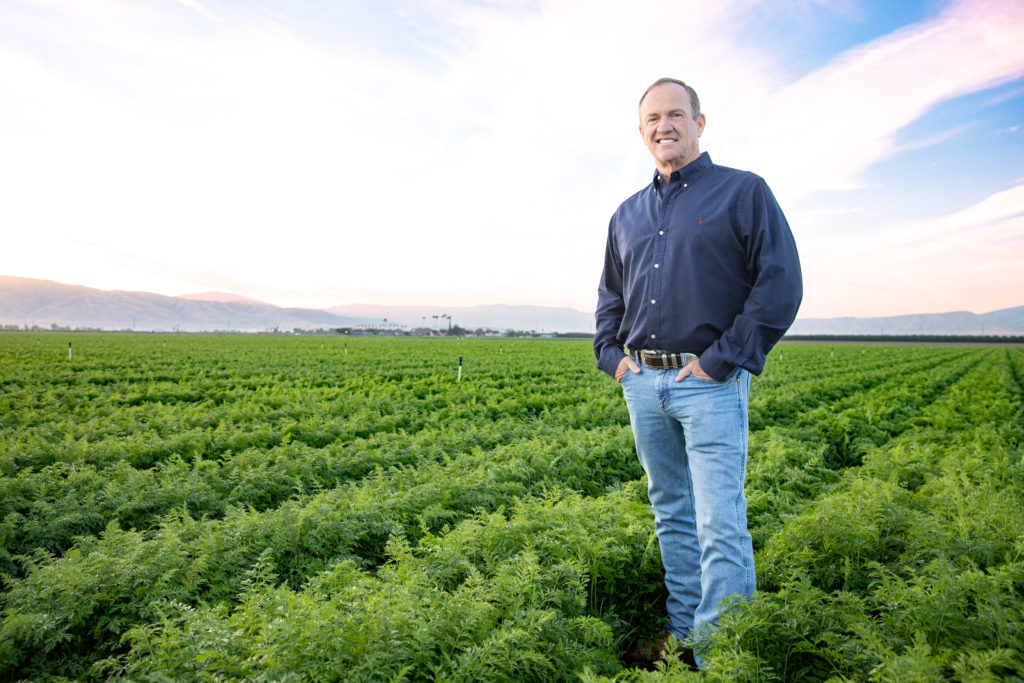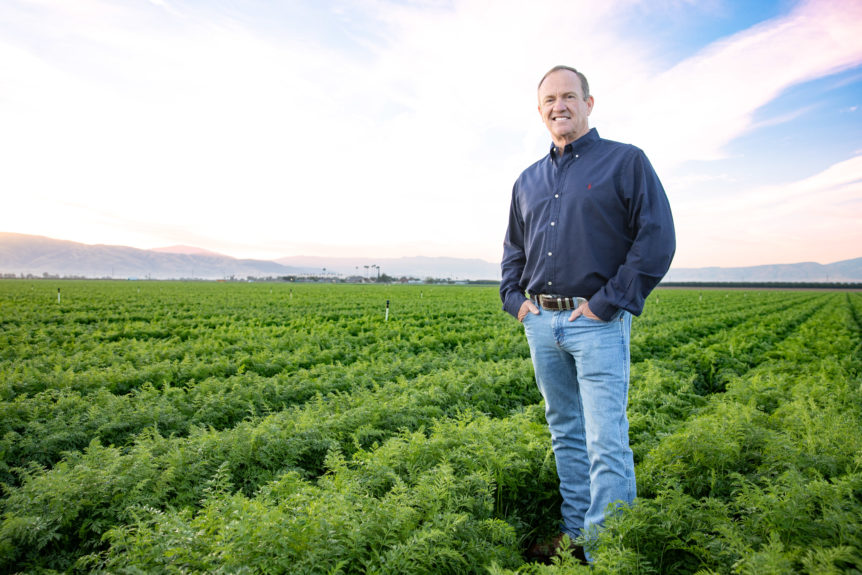
By Frank Giles
In the competitive world of fresh produce, growers must remain agile and quick to adapt to changing conditions. There are many different pathways to success despite the challenges. One path is a growth trajectory to spread risks and ensure supply. Another path is to remain small and focused on a niche product or customer base. And there are all sorts of business models in between.
Grimmway Farms has chosen the growth pattern but has helped smaller growers and ancillary businesses along the way. Today, the company is one of the largest carrot growers in the world, with more than 40,000 acres planted annually.
Jeff Huckaby is a fourth-generation farmer who has been involved with carrot production his entire life. He learned to grow carrots and potatoes from his grandfather at an early age.
He joined Grimmway Farms in 1998 and worked his way up the ranks in various jobs before becoming president of the business in 2015. Huckaby has seen the carrot business evolve into one of the most popular items in the produce department of grocery stores.
“I’ve been growing carrots for about 35 years. I started out driving a tractor, then was a farm manager and farm plant manager, so I’ve had quite a history with Grimmway Farms and have grown with it over the years,” Huckaby says.
Surety of Supply
Huckaby says having worked in all capacities from the growing side to the business side of the company illustrates the vital importance of keeping the customer happy. One of the key ways Grimmway Farms has achieved this is surety of supply all year long.
“We’ve gone to our retail customers and told them we can be your year-round supplier of carrots. You don’t need to worry about when one season ends somewhere and constantly be looking for a new source,” Huckaby says. “Whether it is our carrots coming out of Georgia, California or Colorado, you as the retailer don’t really need to worry about that. We’ll take care of making sure you have a good supply of high-quality affordable carrots for your stores.”
That has been accomplished by having a large footprint in different growing regions. The home-base for Grimmway Farms is California, where two crops per year can be grown.
For a variety of reasons, Huckaby said the company looked to expand to other states. One key reason was the realization that availability of water in California could be a limiting factor in production. The company grows carrots in nine other states. Huckaby says they’ve sought out seasonal sweet spots in those states. While other states can only produce one crop per year, they are positioned to be great for both production and logistics.
Decision to Diversify
The other way Grimmway Farms has maintained and grown its customer base is through organic carrots and diversification into other crops. The farm’s second-largest crop is potatoes with about 20,000 acres planted annually.
“We decided to try organic carrot production in about 1999, and I took on the responsibility to lead that effort,” Huckaby says. “In 2001, we bought a company called Cal-Organic Farms, which really launched us into organic production. Today, we are producing about 15,000 acres of organic carrots. Organics, in general, have become a very important part of our business.”
The organic carrots opened the door for more organic crops. Other crops are planted on the organic ground for beneficial rotation purposes. In total, Grimmway produces 65 different organic crops on 55,000 acres. The company is one of the largest organic growers in the nation.
Southeastern Expansion
One of the sweet spots for regional production was the 2019 acquisition of Generation Farms, based in Lake Park, Georgia. The farm produces carrots in South Georgia and North Florida.
“As we looked to expand our footprint outside of California, we began looking to the Southeast because of the availability of water and to reduce food miles of transporting produce across the country,” Huckaby says. “With the addition of Generation Farms, it was not just another production region. We picked up some great talent, and it really strengthened our year-round surety of supply of carrots. In addition to carrots, we also grow some other organic crops at the location. It is a nice size operation and has grown into a great asset for Grimmway Farms.”
Jason Chandler, director of southeast farming operations for the company, was among the talent that came with the acquisition.
“I am still impressed each day with the level of professionalism and attention to detail that our team members and growers put forth,” Chandler says. “Everything we do from food safety, farming, harvesting, packaging, shipping, logistics, our accounting teams, you name it, we all are focused on putting fresh, healthy and safe produce on tables every day.”
Baby Carrot Revolution
There are few crops that experience a revolution like what was witnessed when baby carrots were conceived. While Grimmway Farms didn’t invent the concept, the farm played a pivotal role in its development.
Baby carrots were developed in the mid-1980s by California farmer Mike Yurosek. Frustrated with the amount of waste from misshapen or imperfect carrots that didn’t meet supermarket standards, Yurosek came up with an innovative solution. He used an industrial green bean cutter to trim down the irregular carrots into smaller, uniform pieces and then polished them into the smooth, rounded shapes recognized today as baby carrots.
“It more than doubled carrot consumption, because people started eating fresh carrots instead of seeing them as a cooking item,” Huckaby says. “It was a revolution and the biggest growth mechanism our industry had ever seen.”
In 1995, Grimmway Farms acquired the farm owned by Yurosek. The industry shifted to breed carrots suitable for baby carrot production. New equipment was designed to optimize processing and efficiency.
“We now have 16 different cuts of fresh carrots to satisfy consumer demands,” Huckaby says. “Utilizing the full crop is very important to us, especially in a world where we are trying to reduce food waste. Anything that doesn’t meet our size and shape standards goes to our juice plant where we create a wide variety of juice and carrot ingredient options.”
Tailored Technology
New technology played a big role in the evolution of baby carrots, but it also has impacted other aspects of Grimmway Farms. The focus is on productivity and efficiency.
“We are constantly looking at how we can automate more processes and be more productive on the ground that we have,” Huckaby says. “In our processing facilities, we’ve developed a lot of cutting and sorting technology in-house because there are not that many carrot equipment manufacturers in the country. For instance, with our carrot harvesters, we start with a John Deere cab, then our engineers build the rest.
“We are big fans of laser weeding machines, especially in our organic production. We have six weeders from Carbon Robotics and can run them 24-7 instead of hand weeding. And we’ve incorporated the use of drones to fly our fields to look at water patterns or scout for diseases.”
Investigating AI
Huckaby says the next frontier the company is investigating is the use of artificial intelligence (AI) in operations. He believes it will play an important role in the future.
“When we look at the best varieties to plant, the timing of planting, populations of plants, inputs, rotations with other crops, all of those things we do manually now,” he says. “And we’ve got some great people doing this with 20 and 30 years of experience, but we believe AI could really help streamline this process.
“We have about 6,800 plantings and harvests per year when you look at all of our crops. Spreadsheets can only take you so far when you are trying to keep track of all that and trying to schedule plantings and rotations three years out. So, we are looking closely at how AI can help us manage all of this.”
Product Innovation
Another key to Grimmway Farms’ success in growing consumer demand has been creating new products. The company works closely with commercial seed suppliers to develop new varieties with a suite of desirable traits for different geographies.
“The first 20 years after baby carrots were great because everybody wanted them,” Huckaby says. “They are available year-round and affordable. It was exciting because consumption was off the charts. But we are always looking for the next step. We now grow different colored carrots with different levels of antioxidants. We have purple, red and yellow carrots in addition to our traditional orange carrots.
“We have a package of ‘rainbow’ carrots so the consumer can get a taste of each color. We have also added more snack-friendly packaging like carrots chips that come with hummus, ranch or guacamole for easy snacking. And we’ve recently developed a carrot fry that looks just like a french fry and can be cooked in an air fryer.”
Employee Emphasis
If you review the company website (grimmway.com), it is clear there is emphasis placed on employee recognition and development. Huckaby says this has been a cornerstone of Grimmway Farms’ success.
“We do a lot of things to recognize our employees. We are right now getting ready to celebrate our big family picnic which brings everyone together for a day full of entertainment and food,” he says. “We also offer scholarships to the kids of our employees to develop their skills. We have summer internships with Grimmway Farms to hopefully get those kids interested in agriculture. It is a pool of talent that we recruit from to make our business better and stronger in the future.”
Huckaby also meets annually with every employee of the company in small groups without supervisors. This helps him stay on top of their needs and to report new benefits.
“I tell them about new benefits we can offer, health care, etc. and ask them about any issues they might be having and how we address those things. This pretty much takes the month of June to get around to all the employees in our different locations.
Productive Partnerships
Grimmway Farms partners with other growers. On non-organic production, the company partners with more than 100 farmers.
“We have some family farms that have been growing for us for more than 30 years. The farms range in size, and we have multiple different arrangements with the farms to develop a program that suits what they need, while supplying us with high-quality produce.”
This philosophy of a rising tide lifts all boats has paid off for Grimmway Farms in growth over the years and holding on to its leadership position. Huckaby says that the approach will continue going forward, and the company will keep advocating for all specialty crop growers in regional associations and at the national level through groups like the International Fresh Produce Association.











